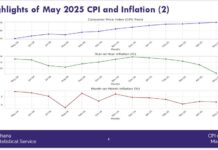- Businesses triple in number
- Employment growth remains uneven
By Juliet ETEFE ([email protected] )
The country’s economy remains heavily informal, with a staggering 92.3percent of business establishments operating outside formal regulatory structures.
This was revealed in the 2024 Integrated Business Establishment Survey (IBES I) Report launched by the Ghana Statistical Service in Accra on Thursday.
The report shows a three-times increase in the number of business establishments, rising from 0.64 million in 2014 to 1.87 million in 2024.
However, despite the expansion of businesses, informality remains a persistent challenge as “an overwhelming 92.3 percent of enterprises operate informally”.
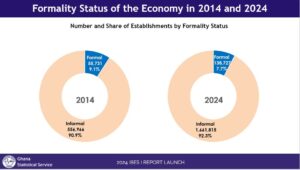
The data also reveal that older businesses – 50 years and above – tend to operate more informally than younger ones and, over time, more businesses are moving into informality rather than formalising.
On a regional basis, while Greater Accra, Upper East and Upper West have seen an increase in informality, Central and Northern Regions are experiencing a gradual shift toward more formal business operations.
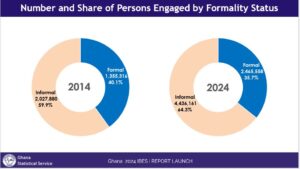
These patterns reflect the evolving nature of business structures across the country.
In view of this, Government Statistician Professor Samuel Kobina Annim highlighted the pressing need for formalising businesses to enhance economic planning, taxation and social security contributions.
He reiterated that with only 7.7 percent of business falling within the formal sector – adhering to regulatory frameworks, tax obligations and structured employment practices – robust measures must be employed to change the narrative.
He explained that informal businesses typically operate without proper registration, limiting their access to financial support, business development services and legal protections.
“The informal sector remains a double-edged sword – on one hand it provides employment and livelihood opportunities for millions, but on the other it limits economic efficiency and national revenue generation,” he noted.
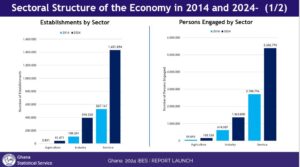
Sectoral
The report on a sector basis shows that the services sector continues to drive the economy, accounting for 76.7 percent of businesses; however, its share has declined over the decade.
This is followed by industry at 21.1 percent and agriculture at 2.2 percent. But while business numbers have surged, employment growth has been relatively slower – with the number of persons engaged moving from 3.28 million in 2014 to 6.90 million in 2024.
This suggests that while businesses are expanding, they are characterised more by micro-sized businesses which absorb only between one to five persons.
Businesses by sizes
The report further has it that the dominance of micro-sized businesses has become more pronounced, making up 90.4 percent of all businesses with a significant increase from 16.6 percent in 2014.
Meanwhile, the share of medium-sized enterprises, which once held the largest portion at 25.9 percent, has dwindled significantly.
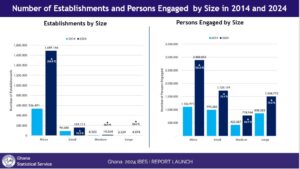
Small businesses represent 8.5 percent, while medium and large enterprises remain rare at 0.8 percent and 0.3 percent respectively.
Micro enterprises are also the largest employers, providing jobs for 2.89 million people – nearly double the workforce of large enterprises. However, the financial stability of businesses remains a challenge.
During his keynote address, Treasurer-Association of Ghana Industries, Raphael Ayitey, emphasised the IBES findings’ importance for shaping future business strategies.
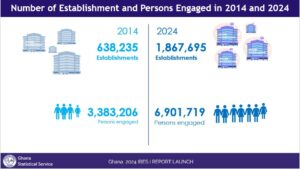
He stated: “There is a growing demand for reliable and timely business data, frequently requested by policymakers and development partners.
“The lack of such data can lead to underestimating the information sector’s contribution to GDP and distort the structure of manufacturing and productivity over time.
“With insights from the IBES report, planners and policymakers now have a clearer understanding of both the formal and informal sectors, paving the way for better-structured business operations in the future”.

IBES I reports
The GSS has updated Ghana’s Business database with the 2024 Integrated Business Establishment Survey (IBES I).
The IBES I report come in several volumes and presents detailed statistics on business growth, employment trends and sectoral distribution, building on data from the previous census conducted in 2014.


